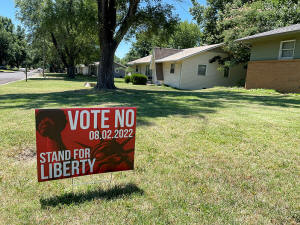Kansas hospital sued for refusing emergency abortion
 Send a link to a friend
Send a link to a friend
 [July 31, 2024]
By Brendan Pierson [July 31, 2024]
By Brendan Pierson
(Reuters) - A Kansas woman on Tuesday sued the University of Kansas
Health System for refusing to give her a medically necessary abortion in
2022, accusing the hospital of violating a federal law on emergency room
treatment.
Mylissa Farmer's lawsuit, filed in federal court in Kansas City,
appeared to be the first case against a hospital under the federal law
for witholding an abortion since the U.S. Supreme Court's June 2022
ruling ending the longstanding nationwide right to abortion.
A spokesperson for the hospital declined to comment.
Farmer went to the hospital on Aug. 2, 2022, at about 18 weeks of
pregnancy after experiencing premature rupture of membranes, the lawsuit
said. That meant her pregnancy was no longer viable and an abortion was
needed to avoid serious complications.
The hospital refused to provide any treatment despite having given an
abortion to another patient under the same circumstances only weeks
earlier, she said.
Farmer said the hospital ignored its own usual practice because of a
state referendum that day on whether to eliminate the right to abortion
in the state constitution, and decided it would be "risky" to perform an
abortion in a "heated" political environment.
The right to abortion in Kansas was ultimately upheld. However, Farmer
was forced to travel to an Illinois clinic to get her abortion, and
continues to suffer physical and emotional harm from her experience,
according to the lawsuit.
[to top of second column]
|

Yard signs in urge residents to vote on an amendment to Kansas'
constitution that would assert there is no right to abortion, in
Wichita, Kansas, U.S., July 10, 2022. REUTERS/Gabriella Borter/File
Photo
 Farmer said the hospital violated
the federal Emergency Medical Treatment and Labor Act (EMTALA),
which requires hospitals to stabilize patients with emergency
medical conditions, as well as a Kansas anti-discrimination law. She
is seeking an unspecified amount of damages.
The extent to which EMTALA requires emergency abortions has been
disputed since the Supreme Court's 2022 ruling, as Republican-led
states have passed abortion bans that often have very narrow medical
emergency exceptions. In June, the Supreme Court upheld a lower
court ruling that EMTALA overrides Idaho's near-total ban, but
litigation over the issue is expected to continue.
(Reporting By Brendan Pierson in New York; Editing by Richard Chang)
[© 2024 Thomson Reuters. All rights reserved.]This material may not be published,
broadcast, rewritten or redistributed.
Thompson Reuters is solely responsible for this content. |